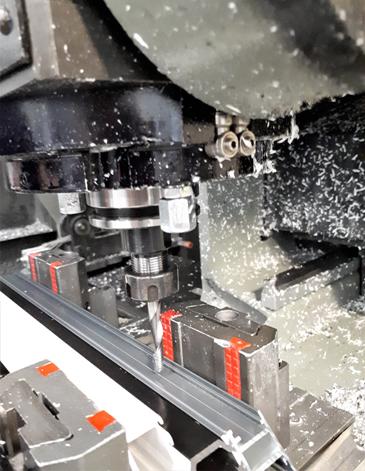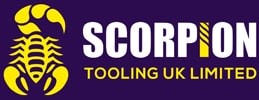KTP Project
Scorpion Tooling have successfully completed a 3-year Government-funded Knowledge Transfer Partnership with the University of Bath to prove that the right combination of tool geometry, /coating and /material improves tool life, surface finish and wear on cutting tools.
Machining difficult-to-cut materials such as titanium Ti-6Al-4V, hypoeutectic and eutectic aluminium alloys, Inconel 718 and austenite-ferrite super duplex 2507 are usually accompanied with low productivity, poor surface quality and short tool life.
Despite their increased usage in the aerospace, automotive and nuclear industries, manufacturing facilities are constantly faced with poor productivity and high manufacturing costs due to the incorrect selection of cutting tools and machining strategies for these materials.
We are proud of our achievements over the past three years and are delighted to introduce our range of high-performance cutting tools, which are now available to our customers.
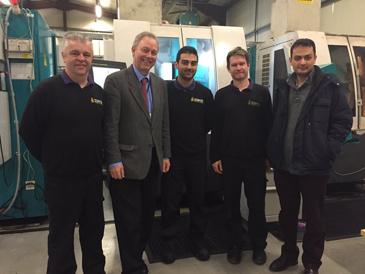

M.A.C.E Project
Machining of Controlled Expansion Alloys
Scorpion Tooling aim to fill the gap in knowledge regarding machinability of controlled expansion and soft magnetic alloys that include Kovar, Invar, MuMetal and Hiperco 50 and to develop a specialist cutting tool set for machining each of these alloys alongside optimised machining parameters.
In partnership with the University of Bath and NiCoFe Materials we are developing unique solutions for effective, economic and environmentally friendly machining of advanced materials.
These materials are known as Controlled Expansion Alloys (CEAs). Due to their unique material properties and microstructure, manufacturing parts from these materials can be difficult and time-consuming resulting in low productivity, high manufacturing costs and poor quality. These issues lead industries to use costly and slow unconventional machining processes.
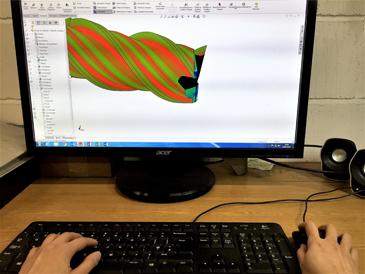

S.T.A.R.T Project
Subtractive technologies for additively realized test-parts manufactured parts
Using Additive Manufacturing or 3D printing; complex geometries with organic designs and optimised structures can be manufactured. Dematerialised structures and near net shaped parts can have substantial benefits in terms of product weight saving and machining requirements. Despite being near net shaped, additive manufactured parts still require some degrees of finish machining. However, AM materials have different machining behaviour than their wrought or forged counterparts.
We know that AM titanium has a different microstructure than wrought titanium. There is a hard and brittle alpha layer present on the surface of AM titanium that can wear and chip conventional tools.
Scorpion Tooling has a range of tools specifically designed for AM parts that has proven to have longer tool life than off the shelf tooling.
Complex geometries produced by AM, often needs complex tooling for finishing. We are specialised in design and manufacture of bespoke tools with complex geometries which often need a plethora of tools and operations to be finished.
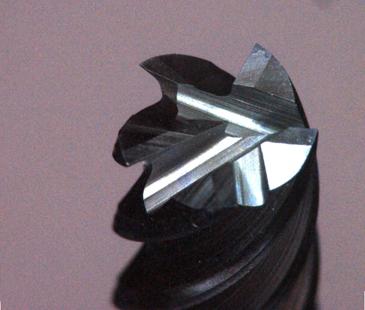

Material Specific Projects
Machining Aerospace Aluminium Alloys
Aluminium and its alloys are widely used in a range of industries from aerospace to automotive, medicine and electronics. In general, aluminium is considered an easy to machine material. However, some specific grades show difficulties during machining due to high ductility or due to the presence of hard oxide and carbide particles.
Choosing the right cutting tool will allow you to use higher cutting speeds and feed rates directly translating to higher productivity.
Scorpion Tooling can offer customers unique tools with specialist coating for machining aluminium alloys that can reduce manufacturing defects and the build-up of material on the tool.
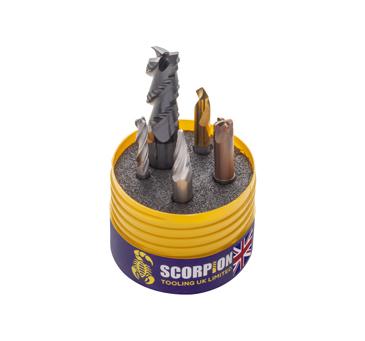
Machining Titanium Alloy Ti-6Al-4V
Titanium alloy Ti-6Al-4V is a material which has seen increasing demand as a result of its high strength-to-weight ratio and corrosion resistance. These properties have proven Ti-6Al-4V to be an attractive material across a variety of industries, from aerospace to medical. However, its combination of thermal and mechanical properties means that Ti-6Al-4V is a difficult material to machine.
A combination of high material strength and hot cutting temperatures has provided extreme conditions for cutting tools used in the machining of titanium alloys, resulting in short tool life and poor surface roughness.
Tools designed by Scorpion Tooling have shown to have improved tool life when compared to other commercial cutters. In addition, our tool produced the most ideal chips and some of the best surface roughness measurements our customers have seen.
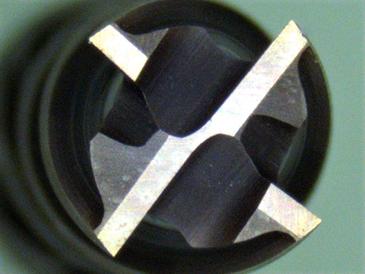
Machining of GF30 PEEK
Polyetheretherketones, known as PEEK, is a thermoplastic material that is increasingly being used in high performance engineering applications because it has high specific properties compared to conventional metallic materials.
Some of these properties, however, result in PEEK being very difficult to machine effectively. Excessive heat input during cutting can lead to material warping or fracture, and PEEK’s high abrasion increases tool wear dramatically, especially for glass-fibre or carbon-fibre reinforced PEEK.
Scorpion Tooling offer bespoke geometries to improve tool wear, material surface roughness and chip formation during the milling of PEEK GF30.
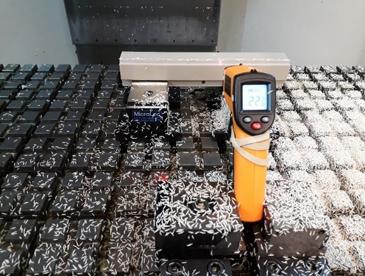
Machining uPVC
The usage of plastic materials over the past century has enabled the modern society to make huge technological advances thanks to its flexible mechanical properties and the ease of manufacturing.
Un-plasticised Polyvinyl Chloride or µPVC is one of the most commonly used plastics in industry with the largest market share in the windows and doors manufacturing sector around Europe, thanks to its characteristics: low cost, environmentally friendly and chemical resistance.
Despite that fact that extensive amount of uPVC materials are used every day, there is no specific cutting geometry and machining environment developed for milling and/or drilling processes. Workers in the window frame industry tend to use general purpose machine tools with standardised cutting tools and tool geometries.
Scorpion Tooling have identified the tool geometry that has the best performance in terms of finish and quality of cut. We can offer a complete machining package including recommendations and guidance on machining parameters and coolant use to create the best environment for your machining operation.
